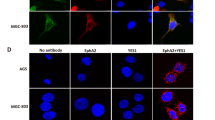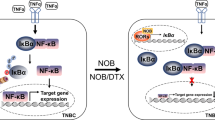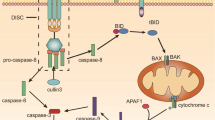Abstract
Chemotherapy remains the main tool for the treatment of cancers, but is often hampered by tumor cell resistance. In this context, the transfer of genes able to accentuate the effect of anticancer drugs may constitute a useful approach, as exemplified by inactivation of nuclear factor (NF)-κB via direct transfer of a gene encoding a negative dominant of its natural inhibitor IκB, leading to improved response to cancer chemotherapy. Following our previous report that transfection of human growth hormone (hGH) gene into human monocytic cell lines may also inactivate NF-κB in another situation, we decided to test the consequences of hGH gene transfer on cancer treatments. We demonstrated that hGH-transfected human myeloid leukemia U937 cells were sensitized to an apoptotic signal mediated by the anticancer drugs. In parallel, we found that, by inhibiting degradation of IκB, hGH gene transfer diminished NF-κB entry into the nuclei of U937 cells exposed to daunorubicin. Finally, we report that hGH-transfected tumor cells engrafted in nude mice responded in vivo to chemotherapy with nontoxic doses of daunorubicin whereas, under the same conditions, control tumor cells remained insensitive. Overall, this study therefore suggests that hGH gene transfer may offer new therapeutic prospects in cancer therapy.
This is a preview of subscription content, access via your institution
Access options
Subscribe to this journal
Receive 12 print issues and online access
$259.00 per year
only $21.58 per issue
Buy this article
- Purchase on Springer Link
- Instant access to full article PDF
Prices may be subject to local taxes which are calculated during checkout




Similar content being viewed by others
References
Moscow JA, Cowan KH . Multidrug resistance Cancer Chemother Biol Response Modif 1990 11: 97–114
Fisher DE . Apoptosis in cancer therapy: crossing the threshold Cell 1994 78: 539–542
Hannun YA . Apoptosis and the dilemma of cancer chemotherapy Blood 1997 89: 1845–1853
Lowe SW, Bodis S, McClatchey A et al. p53 status and the efficacy of cancer therapy in vivo Science 1994 266: 807–810
Rodenhuis S, Richel DJ, van der Wall E et al. Randomised trial of high-dose chemotherapy and haemopoietic progenitor-cell support in operable breast cancer with extensive axillary lymph-node involvement Lancet 1998 352: 515–521
Caponigro F, French RC, Kaye SB . Protein kinase C: a worthwhile target for anticancer drugs? Anticancer Drugs 1997 8: 26–33
Tsuruta Y, Mandai M, Konishi I et al. Combination effect of adenovirus-mediated pro-apoptotic bax gene transfer with cisplatin or paclitaxel treatment in ovarian cancer cell lines Eur J Cancer 2001 37: 531–541
Van Antwerp DJ, Martin SJ, Kafri T et al. Suppression of TNF-α–induced apoptosis by NF-κB Science 1996 274: 787–789
Wang C-Y, Mayo MW, Baldwin AS Jr . TNF- and cancer therapy-induced apoptosis: potentiation by inhibition of NF-κB Science 1996 274: 784–786
Wang CY, Cusack JC Jr, Liu R et al. Control of inducible chemoresistance: enhanced anti-tumor therapy through increased apoptosis by inhibition of NF-kappaB Nat Med 1999 5: 412–417
Cusack JC Jr, Liu R, Baldwin AS Jr . Inducible chemoresistance to 7-ethyl-10-[4-(1-piperidino)-1-piperidino]-carbonyloxycamptothecin (CPT-11) in colorectal cancer cells and a xenograft model is overcome by inhibition of nuclear factor-kappaB activation Cancer Res 2000 60: 2323–2330
Haeffner A, Thieblemont N, Déas O et al. Inhibitory effect of growth hormone on TNF-α secretion and nuclear factor-κB translocation in lipopolysaccharide-stimulated human monocytes J Immunol 1997 158: 1310–1314
Henkart PA . ICE family proteases: mediators of all apoptotic cell death? Immunity 1996 4: 195–201
Haeffner A, Déas O, Mollereau B et al. Human growth hormone prevents monocytic cells from Fas-mediated apoptosis by up-regulating Bcl-2 Eur J Immunol 1999 29: 334–344
Mollereau B, Deckert M, Déas O et al. CD2-induced apoptosis in activated human peripheral T cells. A Fas-independent pathway that requires early protein tyrosine phosphorylation J Immunol 1996 156: 3184–3190
Zamzami N, Marchetti P, Castedo M et al. Reduction in mitochondrial potential constitutes an early irreversible step of programmed lymphocyte death in vivo J Exp Med 1995 181: 1661–1672
Cowan KH, Batist G, Tulpule A et al. Similar biochemical changes associated with multidrug resistance in human breast cancer cells and carcinogen-induced resistance to xenobiotics in rats Proc Natl Acad Sci USA 1986 83: 9328–9332
Turnbull KJ, Brown BL, Dobson PR . Caspase-3–like activity is necessary but not sufficient for daunorubicin-induced apoptosis in Jurkat human lymphoblastic leukemia cells Leukemia 1999 13: 1056–1061
Das KC, White CW . Activation of NF-κB by antineoplastic agents. Role of protein kinase C J Biol Chem 1997 272: 14914–14920
Baeuerle PA, Baltimore D . IκB: a specific inhibitor of the NF-κB transcription factor Science 1988 242: 540–546
Zhou G, Kuo MT . NF-kappaB–mediated induction of mdr1b expression by insulin in rat hepatoma J Biol Chem 1997 272: 15174–15183
Efferth T, Fabry U, Osieka R . Apoptosis and resistance to daunorubicin in human leukemic cells Leukemia 1997 11: 1180–1186
Noonan KE, Beck C, Holzmayer TA et al. Quantitative analysis of MDR1 (multidrug resistance) gene expression in human tumors by polymerase chain reaction Proc Natl Acad Sci USA 1990 87: 7160–7164
Freeman SM, Abboud CN, Whartenby KA et al. The “bystander effect”: tumor regression when a fraction of thetumor mass is genetically modified Cancer Res 1993 53: 5274–5283
Klatzmann D, Valery CA, Bensimon G et al. A phase I/II study of herpes simplex virus type 1 thymidine kinase “suicide” gene therapy for recurrent glioblastoma. Study Group on Gene Therapy for Glioblastoma Hum Gene Ther 1998 9: 2595–2604
Santodonato L, D'Agostino G, Santini SM et al. Local and systemic antitumor response after combined therapy of mouse metastatic tumors with tumor cells expressing IFN-alpha and HSVtk: perspectives for the generation of cancer vaccines Gene Ther 1997 4: 1246–1255
Yamabe K, Shimizu S, Ito T et al. Cancer gene therapy using a pro-apoptotic gene, caspase-3 Gene Ther 1999 6: 1952–1959
Tai YT, Strobel T, Kufe D et al. In vivo cytotoxicity of ovarian cancer cells through tumor-selective expression of the BAX gene Cancer Res 1999 59: 2121–2126
Baskar S, Glimcher L, Nabavi N et al. Major histocompatibility complex class II+ B7-1+ tumor cells are potent vaccines for stimulating tumor rejection in tumor-bearing mice J Exp Med 1995 181: 619–629
Celluzzi CM, Mayordomo JI, Storkus WJ et al. Peptide-pulsed dendritic cells induce antigen-specific, CTL-mediated protective tumor immunity J Exp Med 1996 183: 283–287
Tahara H, Lotze MT, Robbins PD et al. IL-12 gene therapy using direct injection of tumors with genetically engineered autologous fibroblasts Hum Gene Ther 1995 6: 1607–1624
Pandha HS, Martin LA, Rigg AS et al. Gene therapy: recent progress in the clinical oncology arena Curr Opin Mol Ther 2000 2: 362–375
Ferrari D, Stepczynska A, Los M et al. Differential regulation and ATP requirement for caspase-8 and caspase-3 activation during CD95- and anticancer drug–induced apoptosis J Exp Med 1998 188: 979–984
Cohen GM . Caspases: the executioners of apoptosis Biochem J 1997 326: 1–16
Franzoso G, Biswas P, Poli G et al. A family of serine proteases expressed exclusively in myelo-monocytic cells specifically processes the nuclear factor-κB subunit p65 in vitro and may impair human immunodeficiency virus replication in these cells J Exp Med 1994 180: 1445–1456
Ng ST, Zhou J, Adesanya OO et al. Growth hormone treatment induces mammary gland hyperplasia in aging primates Nat Med 1997 3: 1141–1144
Wennbo H, Tornell J . The role of prolactin and growth hormone in breast cancer [see comments] Oncogene 2000 19: 1072–1076
Acknowledgements
We thank Patrice Ardouin (Institut Gustave Roussy, Villejuif) for his kind help in animal studies, Béatrice Ducot (hôpital de Bicêtre) for help in statistical analyses and Gisèle Chavanel for technical expertise. This work was supported by Association pour la Recherche sur le Cancer and Ligue Nationale contre le Cancer, Comité des Hauts-de-Seine (to FH). CC received a fellowship from Ligue Nationale contre le Cancer, Comité de l'Essonne, and Comité du Val-de-Marne.
Author information
Authors and Affiliations
Corresponding author
Rights and permissions
About this article
Cite this article
Cherbonnier, C., Déas, O., Vassal, G. et al. Human growth hormone gene transfer into tumor cells may improve cancer chemotherapy. Cancer Gene Ther 9, 497–504 (2002). https://doi.org/10.1038/sj.cgt.7700467
Received:
Published:
Issue Date:
DOI: https://doi.org/10.1038/sj.cgt.7700467
Keywords
This article is cited by
-
Use of physiological doses of human growth hormone in haematological patients receiving intensive chemotherapy promotes haematopoietic recovery: a double-blind randomized, placebo-controlled study
Bone Marrow Transplantation (2007)
-
Experimental study on effect of recombinant human growth hormone combined with chemotherapy on stomach neoplasms implanted in nude mice
The Chinese-German Journal of Clinical Oncology (2007)
-
Chemosensitization by erythropoietin through inhibition of the NF-κB rescue pathway
Oncogene (2005)
-
Growth hormone releasing hormone plasmid supplementation, a potential treatment for cancer cachexia, does not increase tumor growth in nude mice
Cancer Gene Therapy (2005)
-
Potentiation of tumour apoptosis by human growth hormone via glutathione production and decreased NF-κB activity
British Journal of Cancer (2003)



